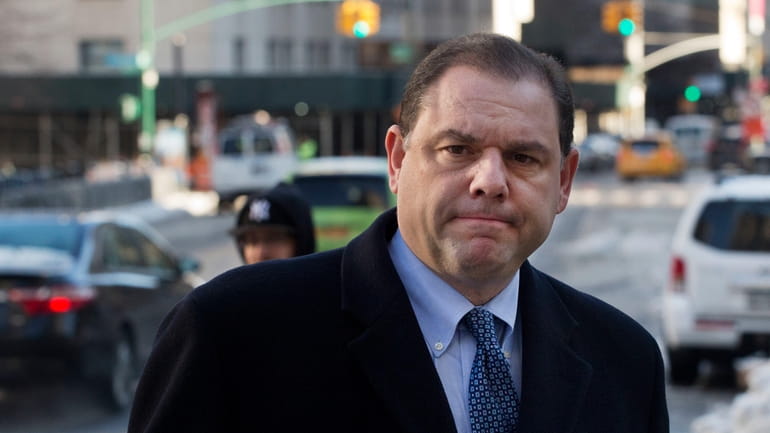U.S. Supreme Court weighs appeals of NY public corruption cases

Joseph Percoco, a former aide to Gov. Andrew M. Cuomo, arrives at federal court for his corruption trial, March 8, 2018, in New York City. Credit: AP/Mark Lennihan
WASHINGTON — Supreme Court justices on Monday questioned where to draw the line between political influence and political corruption as they heard arguments on two New York bribery cases, including one involving a former top aide to Gov. Andrew Cuomo.
Most of the justices appeared poised to tighten the rules once again for public corruption cases as they weighed how to protect private lobbyists seeking to legally influence public officials while also making it illegal for public officials to engage in bribery schemes.
And some of the justices appeared sympathetic to the appeals of those two cases which emerged from a corruption crackdown launched by former U.S. Attorney Preet Bharara of the Southern District of New York.
The court first heard arguments on an appeal by Joseph Percoco — Cuomo’s former executive deputy secretary from 2011 to 2016 and a close ally and friend — of his 2018 conviction for violating the honest-services fraud statute by taking a bribe.
During an eight-month period in 2014 when he left his state job to work as Cuomo’s reelection campaign manager, Percoco solicited and accepted $35,000 from an executive to help him avoid a potentially expensive state-required labor agreement on a state-funded project.
Percoco was convicted and sentenced to six years in prison. The Second Circuit Court of Appeals upheld his conviction.
Nicole Reaves, arguing for the government, said that Percoco was not simply an influential lobbyist but that he functioned in effect as a government official and had decided to return to his job as Cuomo’s top aide when he accepted the bribe.
“While functioning as a government official and after he had decided to return to formal government employment, … [Percoco] accepted multiple bribes in exchange for commanding a government agency to reverse a final decision.”
But Percoco’s attorney Jacob Roth said Percoco “possessed no legal authority to bind the state or make a decision for it. What he did have — like many lobbyists, donors, interest groups, and others — was influence.”
Roth laid out his definition of a public official: “A public official is an agent of the public and, therefore, violates the bribery laws if he sells his official authority. This concept is fundamentally inapplicable to someone who is not a public official, someone who is not an agent of the public and has no official authority to sell.”
As the justices listened to the arguments, they groped for a definitive way to distinguish legal lobbying from illegal actions.
Justice Samuel Alito said some lobbyists have deep-seated connections and asked if the ruling could result in criminal charges against “super-super effective lobbyists.” He added, “There’s a concern about interpreting this statute to sweep in lobbying.”
But Justice Elena Kagan picked up on an argument made by Reaves and a hypothetical argument posed by Justice Clarence Thomas.
“You can spin lots of different versions on it, you know, up to the point where a public official just, like, resigns his office every time he wants to take a bribe and then picks up his office again when he's completed the bribe,” she said.
“And there has to be something wrong with that,” Kagan said, addressing Roth. “But your theory would suggest that you can’t prosecute the public official under this statute.”
Justice Ketanji Brown Jackson noted Reaves' argument that Percoco continued to use his official state office, made official calls and took the payment after saying he would return to his job.
“How do you distinguish that person from a lobbyist?” Jackson asked. “Lots of people leave their former employment — maybe their key card hasn’t been turned off yet — and engage in relations with people they used to work with.”
In the second hearing, justices heard arguments over the appeal of the conviction of developer Louis Ciminelli for conspiring with lobbyist Todd Howe and state official Alain Kaloyeros to rig bids to ensure contracts went to their firms from the state’s $1 billion revitalization initiative for the Buffalo area — known as the “Buffalo Billion.”
Ciminelli’s attorney Michael Dreeben urged the justices to reverse the Second Circuit’s ruling to uphold the convictions, and justices discussed how they should handle the case, which many of them thought had been decided under the wrong legal theory.
“For decades, the Second Circuit has applied an invalid theory of wire fraud called the right-to-control doctrine. The government now agrees,” Dreeben said.
Deputy Solicitor General Eric Feigin argued against a reversal, but said, “We would be fine with the Court explaining that that's not the right way for the Second Circuit to be going about thinking about these cases.”
What to Know
- The Supreme Court heard arguments on two New York bribery cases, including one involving a former top aide to Gov. Andrew Cuomo.
- Most of the justices appeared poised to tighten the rules once again for public corruption cases as they weigh where to draw the line between political influence and political corruption
- One of the cases involves an appeal by Joseph Percoco -- a close ally of former Gov. Andrew M. Cuomo -- of his 2018 conviction for violating the honest-services fraud statute.

Updated now Newsday travel writer Scott Vogel took the ferry over to Block Island for a weekend of fun.

Updated now Newsday travel writer Scott Vogel took the ferry over to Block Island for a weekend of fun.
